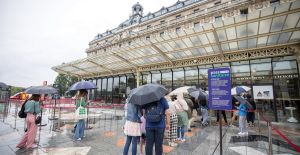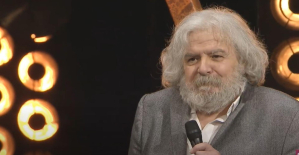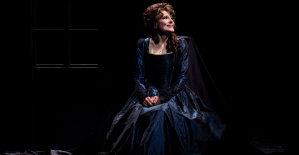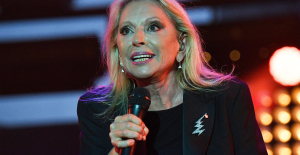Young people in the constantly sold-out hall. Enthusiasm for new things. Pupil to student laboratory experiments with stage practice. Performances of all kinds and party atmosphere. This is the exemplary Opera Forward Festival at the Dutch National Opera in Amsterdam. For the seventh time in March, contemporary forms of music theater were tried out in concentrated form here – in the wonderfully democratically playable building on the Amstel.
Three premieres, including two premieres and a European premiere, were on the program. “Change the world, it needs it” – this time, after Brecht/Eisler, was the German festival motto.
And that's also the name of a collage performance with the same title and music by Eisler, Schumann, Rachmaninoff and Beethoven with members of the opera studio and a voice artist. The question was asked whether the big revolution is needed or whether small changes will suffice.
The music theater of today and possibly of tomorrow, that sounds quite familiar and accessible in Amsterdam, where opera is currently of the highest level thanks to the Dutch National Opera, but still only has a short tradition. In any case, it uses well-known topics and myths to immediately enter into dialogue, to communicate, to exchange ideas between makers and consumers.
This is what happens between Peter Sellars' activist take on black feminism icon and music hall goddess Josephine Baker, a performance by American impromptu jazz musician Tyshawn Sorey, and a noisy, thoroughly conventional operatic adaptation of George Orwell's parable-like totalitarianism classic Animal Farm. by the Russian Alexander Raskatov.
The opera by the exile Raskatov, who lives in Germany, may have acquired a new political urgency at the moment, but its content is timeless. On a farm, animals take power as equals, but as we all learned at school, “Some are more equal than others.”
The famous slogan stands here at the end of Damiano Michieletto's virtuoso, lively, colorfully entertaining, but also satirically evil production in pink neon letters between the marble walls of a slaughterhouse, in which cages with sad, gray-headed animals were initially hanging. Most of them have now humanized themselves in smart clothes and without masks, even if there has been a little collateral damage on the way to the new hierarchy, which only replaces and does not abolish those of the people who have ruled them so far.
In Raskatov's English sung two-part piece, which is a little over two hours long and which the electronically amplified, percussion-rich Netherlands Chamber Orchestra cheerfully whips ahead under the energetic bassist Akiki, the brutalized people behave much more primitively than the initially lethargic, slowly rebelling animals. But all 14 solo roles are individually marked by their articulation and the resulting vocal treatment.
The pigs grunt bass-saturated, the goats bleat soprano, the old mare whinnies in wispy coloratura, the dogs bark, the donkey screeches and Blacky the raven, commenting in a Cassandra-like manner, turns over again between falsetto and chest voice, as the only human from the beginning (in figure of Raskatov's wife Elena Vassilieva) - until Napoleon (or better: Stalin as a pig) in a blue jacket (Misha Kiria) emerges as the new dictator.
A Darwinian Noah's Ark with a children's chorus of poultry and rather passive masses in front of a few individualists running astray increases in this colorful score between over-the-top grotesque opera drama and film music sounds, which often works with noises, which is often illustrative, but nevertheless quickly captivates. This will certainly also succeed with the co-producing partners in Vienna, Palermo and Helsinki: So the dissemination of this opulent opera is taken care of.
It may not be a dream of the future, but it is successful music theater today. Just like a year ago in the same place Manfred Trojahn's opera! Award 2023 excellent myth rewriting "Eurydice - the lovers, blind".
"Perle Noire: Meditations für Josephine" does not move on this level. In general, these two hours about Josephine Baker, which are a little too long, are not an opera, but rather an acted concert. Peter Sellars has his protagonists step out over seven steps to the diva pedestal, squirm on the ground and swear furiously.
Because of course this piece, which takes seven of Baker's cabaret numbers with racist connotations and takes them to the next level and radicalizes them, is charged with activists. In the interludes by Claudia Rankine, the legendary dancer and peace fighter becomes a woken prima donna, without any bananas or brilliantine in her hair. But definitely with transparent nudity. And with the almost stage-busting personality of the soprano Julia Bullock, who has long been a John Adams muse, but is also at home in the baroque and spiritual.
Their rich, sonorous, gently caressing, merciful, angry voice knows no vocal boundaries and no stylistic limits. Framed by six instrumentalists who are very closely related to her musically, the composer Tyshawn Sorey on percussion and piano, she rocks the evening. An event. She alone is worth every opera.
And even if her Josephine has little in common with the original Baker, one hangs on Bullock's every word, watching her spellbound. Next year, she will be appearing in a new opera about the trial of the oil company Shell (in which the Dutch Crown has a stake) in Forward No. 8 opera on the theme of 'Responsibility'; 100 years later, there will also be a feminist sequel to Stravinsky's Oedipus Rex with Samy Moussa's Antigone, both to be directed by much-sought-after choreographer Wayne McGregor in a joint effort with the Dutch National Ballet.
The Aalto Music Theater in Essen is also capable of contemporary opera that wows an enthusiastic audience. And not just because at the end of Gordon Kampe's setting of Lars von Trier's English screenplay for the cult film "Dogville", the heroine Grace mows down the villagers in a furious showdown and then a vintage car drives their primitive dwellings together over a slope along the stage portal under sheaves of fire. The wonderful Lavinia Dames in the Nicole Kidman role as here Faye Dunaway-esque Bonnie shoots her way free like an angel of death.
The opera version, skilfully condensed to 105 minutes and somewhat parlando-monotonous at the beginning, gains momentum from the halfway point, because Kampe in his polystylistically piling up a lot, atmospherically skilfully blending score, which Tomas Netopil crammed together at the podium in a tonally rigid manner, finally lets individuals sing, where to Beginning beautifully harmonious, the village collective, slowly finding a tone, vocally united up to the twelve-piece ensemble.
David Hermann's sober staging, which takes up von Trier's epic Brecht effect of the house floor plans only recorded in the studio, becomes denser and more intense; to which the minimalistic strong stage design including light by Jo Schramm contributes decisively.
“Dogville” is also not academic new sounding, but immediately gripping, from a parable in the strict Thornton-Wilder style forming an idiosyncratic story, tonally engaging opera as an always lively drama. Here, too, 15 protagonists gain different statures and go through changes.
The 18 smoothly edited scenes unwind like a breathless talkie. And they are always intertwined with the scene, the music gains its meaning from the necessity of the scenic. This is not new, but it is well-versed and thrilled the audience to the full house.

 B:SM will break its investment record this year with 62 million euros
B:SM will break its investment record this year with 62 million euros War in Ukraine: when kyiv attacks Russia with inflatable balloons loaded with explosives
War in Ukraine: when kyiv attacks Russia with inflatable balloons loaded with explosives United States: divided on the question of presidential immunity, the Supreme Court offers respite to Trump
United States: divided on the question of presidential immunity, the Supreme Court offers respite to Trump Maurizio Molinari: “the Scurati affair, a European injury”
Maurizio Molinari: “the Scurati affair, a European injury” Irritable bowel syndrome: the effectiveness of low-carbohydrate diets is confirmed
Irritable bowel syndrome: the effectiveness of low-carbohydrate diets is confirmed Beware of the three main sources of poisoning in children
Beware of the three main sources of poisoning in children First three cases of “native” cholera confirmed in Mayotte
First three cases of “native” cholera confirmed in Mayotte Meningitis: compulsory vaccination for babies will be extended in 2025
Meningitis: compulsory vaccination for babies will be extended in 2025 Thanks to intelligent cameras, RATP will indicate the least crowded trains on line 14
Thanks to intelligent cameras, RATP will indicate the least crowded trains on line 14 Dubai begins the transformation of Al-Maktoum to make it the future “largest airport in the world”
Dubai begins the transformation of Al-Maktoum to make it the future “largest airport in the world” When traveling abroad, money is a source of stress for seven out of ten French people
When traveling abroad, money is a source of stress for seven out of ten French people Elon Musk arrives in China to negotiate data transfer and deployment of Tesla autopilot
Elon Musk arrives in China to negotiate data transfer and deployment of Tesla autopilot Two people arrested for attempted damage to classified property at the Musée d’Orsay
Two people arrested for attempted damage to classified property at the Musée d’Orsay Death of composer Jean Musy, at 76, author of the music of Papy fait de la resistance, Les Champs-Élysées
Death of composer Jean Musy, at 76, author of the music of Papy fait de la resistance, Les Champs-Élysées Fanny Ardant prodigious in The Wound and the Thirst
Fanny Ardant prodigious in The Wound and the Thirst Hospitalized for pneumonia, Véronique Sanson cancels her concert in Nantes
Hospitalized for pneumonia, Véronique Sanson cancels her concert in Nantes Skoda Kodiaq 2024: a 'beast' plug-in hybrid SUV
Skoda Kodiaq 2024: a 'beast' plug-in hybrid SUV Tesla launches a new Model Y with 600 km of autonomy at a "more accessible price"
Tesla launches a new Model Y with 600 km of autonomy at a "more accessible price" The 10 best-selling cars in March 2024 in Spain: sales fall due to Easter
The 10 best-selling cars in March 2024 in Spain: sales fall due to Easter A private jet company buys more than 100 flying cars
A private jet company buys more than 100 flying cars This is how housing prices have changed in Spain in the last decade
This is how housing prices have changed in Spain in the last decade The home mortgage firm drops 10% in January and interest soars to 3.46%
The home mortgage firm drops 10% in January and interest soars to 3.46% The jewel of the Rocío de Nagüeles urbanization: a dream villa in Marbella
The jewel of the Rocío de Nagüeles urbanization: a dream villa in Marbella Rental prices grow by 7.3% in February: where does it go up and where does it go down?
Rental prices grow by 7.3% in February: where does it go up and where does it go down? Europeans: a senior official on the National Rally list
Europeans: a senior official on the National Rally list Blockade of Sciences Po: the right denounces a “drift”, the government charges the rebels
Blockade of Sciences Po: the right denounces a “drift”, the government charges the rebels Even on a mission for NATO, the Charles-de-Gaulle remains under French control, Lecornu responds to Mélenchon
Even on a mission for NATO, the Charles-de-Gaulle remains under French control, Lecornu responds to Mélenchon “Deadly Europe”, “economic decline”, immigration… What to remember from Emmanuel Macron’s speech at the Sorbonne
“Deadly Europe”, “economic decline”, immigration… What to remember from Emmanuel Macron’s speech at the Sorbonne These French cities that will boycott the World Cup in Qatar
These French cities that will boycott the World Cup in Qatar Mercato: Fonseca coach of AC Milan? The Lille coach speaks
Mercato: Fonseca coach of AC Milan? The Lille coach speaks Ligue 1: OM with a three-way defense, Lens changes almost nothing
Ligue 1: OM with a three-way defense, Lens changes almost nothing Ligue 1: PSG officially crowned champion of France for the 12th time
Ligue 1: PSG officially crowned champion of France for the 12th time Ligue 1: Lyon offers Monaco and gets closer to a European place
Ligue 1: Lyon offers Monaco and gets closer to a European place

















